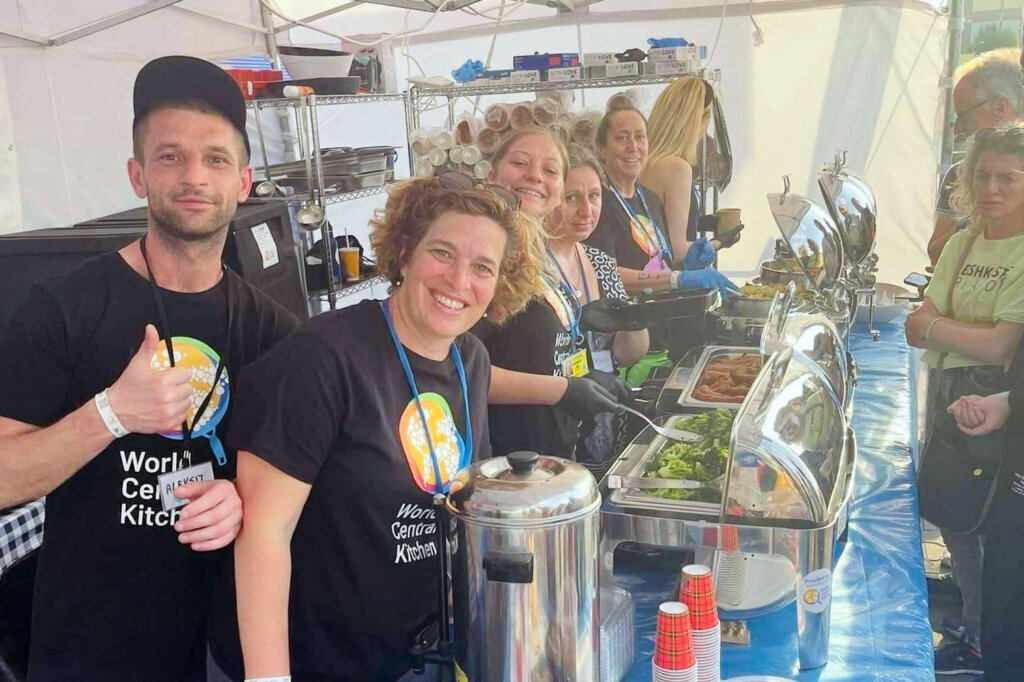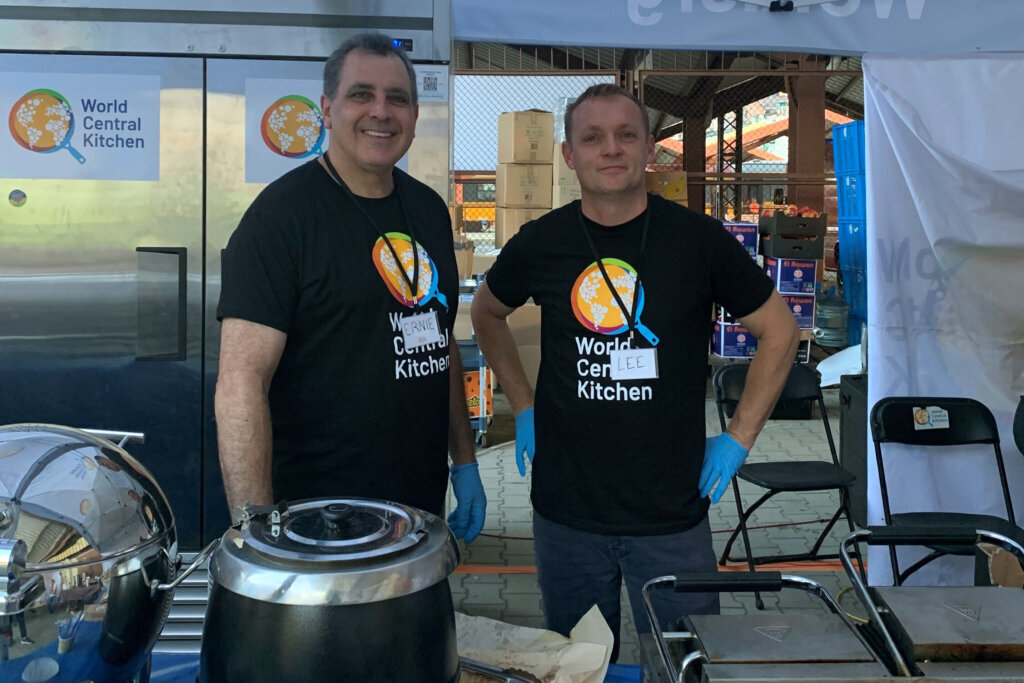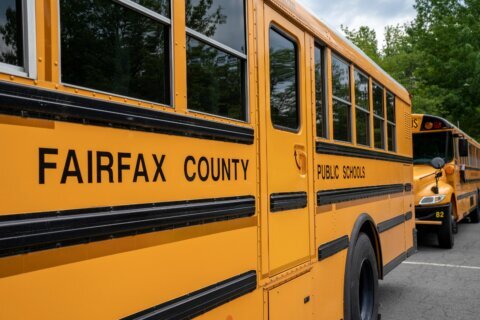How far would you go to help refugees of the Russian invasion of Ukraine?
For two married Fairfax County Public Schools teachers, the answer is more than 4,600 miles.
Lee Hedrick, a government teacher at W.T. Woodson High School, and Meredith Hedrick, chair of the English for Speakers of Other Languages department at Annandale High School, made the 18-hour journey to Przemysl, Poland, to help feed Ukrainian refugees.
Lee and Meredith, who celebrated their 18th wedding anniversary a couple days ago, were both Peace Corps volunteers. Lee served in Senegal; Meredith served in Turkmenistan.
This spring, when they saw what was happening during Russia’s brutal war on Ukraine, they looked for ways to help. One of the reasons was because of what they taught their students.
“In our classes, we’re trying to teach the importance of history, of empathy, of taking care of one another,” Meredith told WTOP. “Just from our life experience of traveling, and having this sense of service, then being educators and trying to teach our kids to be role models and to be changemakers, and then feeling like we had the skills and we were prepared.”
“We’re familiar in working with different cultures because we had also lived overseas — I felt like our skills and experience lended itself well to going over and helping out.”
For Lee, being a history teacher and teaching about different conflicts had a lot to do with it too.
“In the past, we’ve learned about World War I or World War II and the atrocities there. And I felt like this was a conflict taking place during our lifetime where I would hate to look back 10 years in the future and say, ‘Oh, this was taking place and I did nothing,’” Lee said.
“You learn about things like, after the Holocaust, you see the phrase ‘never again,’ and I didn’t want to just stand by and watch this horrible conflict unfold and do nothing.”
They decided on D.C. chef and humanitarian Jose Andres’ World Central Kitchen after considering different options. Not only because Andres is a hometown hero, but also because it was an organized and structured effort.
The Hedricks were responsible for their own airfare, lodging and transport. Lee said they used some frequent flyer miles, “we patched together some other things, and thankfully, it’s pretty inexpensive in Eastern Europe.”
Meredith went to Poland first, landing in Warsaw, then took a 6-hour train ride to get to the border city of Przemysl. For Lee, it was a 4-hour drive in a rented car.

Meredith said Przemysl is a picturesque European locale with cafes and old streets — an old city with little hint of the war next door.
“But then you go to the train station, and it’s really apparent,” Meredith said. “You walk in, there’s crowds of people. There’s military handing out basic supplies, keeping everything orderly. There’s people with yellow vests with the languages written on their back, what they speak.”
“You go to the platform, there was the army there handing out immediate needs, for feminine products, toys for kids. Basic necessities — except for food.”
Which is where World Central Kitchen comes in.
Meredith said World Central Kitchen had two stations at the train station: one outside and one immediately on a platform. They had also converted an industrial area into a big kitchen — operations at which will be paused at the end of July.
She was at the humanitarian center, an old converted shopping center called Tesco, roughly equivalent to a Target or Walmart.
“That’s where the refugees can spend a couple hours or overnight while they’re deciding what their next moves are,” Meredith said.
While Meredith worked in distribution, Lee worked primarily in the kitchen.

“We’d spend the morning cutting up vegetables then we’d also make panini sandwiches,” Lee said, estimating that they’d make 4,000 to 5,000 sandwiches a day. Then drivers would take all the hot food and sandwiches, and they’d send them out by truck to different distribution centers.
Lee said from 9 a.m. until 4 or 5 p.m., volunteers were making food. “And then I would go back, take a few hours rest, then I’d go to the train station and work from 7 p.m. to 11, 11:30 p.m.”
At the train station, there was a mix of people coming into Poland from Ukraine, but also going back to Ukraine. Lee said they had different reasons for going back to Kyiv or Lviv: to visit family, to see their husbands.
“The scene is pretty chaotic, because you quickly realize it’s only women and children, all the men are back in Ukraine,” Lee said.
“It’s women with one kid, two kids, five kids, a range of ages … it’s pretty hectic because they’re trying to get their space in line, and we’re also trying to get them food. So some of them could come up to the distribution center and get food. Then later on, we’d actually walk around with food and hand out water, apples, bananas and sandwiches. So it’s a pretty chaotic scene at the train station.”
Shortly before speaking with WTOP, the Hedricks received an email from World Central Kitchen: “With the incredible support of nearly 1,500 volunteers like you, we have served more than 11.5 million meals to refugees in Poland. Thank you for making this work possible.”
Those meals weren’t cheap fare either, Meredith said. “They really have high standards as far as the products and the food that they’re using.”
But that didn’t stop Lee from making a sort of “Happy Meal” for refugees.
“We’ve all probably single-parented for some period of time before, and you realize that, after eight hours or maybe a couple of days or so, you get really worn down,” Lee said. “But you realize that these moms are spending two months or three months taking care of their children, and they’re probably exhausted.”
“You see a lot of young kids come through, so we decided to go to the toy store and just buy stuffed animals and Matchbox cars. So when little kids would come through, we’d give them an option of a couple different toys.”
They also bought a bunch of candy, but: “We realized the old men were taking all the candy.”
Which led to them making small containers of candy and a few other things for kids. “And that seemed to work out really well,” Lee said.
Even the senior citizens liked the finger puppets.
“We’re trying to give them a smile, a healthy meal, to try to make them feel a little more human. And we want to give them some toys just, make that journey a little bit easier,” Lee said.
Meredith added: “You’re not just there serving food, you’re developing relationships.”
She said they’re hoping to return when they have a chance. Possibly next year.
“I don’t think this is anything that’s going to resolve itself soon,” Meredith said. “But I do think we have an opportunity to help here.”
She pointed to Operation SafeDrop, which does emergency evacuations out of Ukraine, and noted that actor Liev Schreiber’s BlueCheck Ukraine vets organizations that are donating to Ukraine to make sure that the money is going to where it’s supposed to.
There are other ways to help as well.
“Ukrainian families are starting to settle here,” Meredith said. “If you’re on different volunteer sites, you can see ways to help them. For example, they need household goods and toiletries, they need help registering in schools. They need help, they need people to take them around the city to show them the city. So those are some ways you can get involved.”








